Inside Nate Oats' long-winding journey to the Final Four
Nate Oats was one of the last to leave the Alabama basketball locker room in Los Angeles.
At 9:32 p.m. local time, he began his walk to the team bus. On his head sat a Final Four hat. Around his neck rested the Elite Eight net. On his back hung his bag, no longer carrying the weight of trying to get the Crimson Tide to the Final Four.
Oats had done it. That night, Alabama defeated Clemson in the Elite Eight to advance to college basketball’s biggest stage. Oats accomplished it in his fifth season at Alabama, something no other Crimson Tide coach had achieved before.
To think a little over a decade ago, he was a high school coach, not even coaching at the collegiate level, much less in the Final Four.
“You’re kind of grinding in the moment back in high school,” Oats said as he walked farther away from the locker room in Los Angeles. “Not really thinking about coaching college. You’re just thinking about making your players the best they can be. Everybody asks me, ‘How do you make the jump from high school to college?’ Just be great at what you’re doing now, and if the opportunity comes, it comes.”
It did for Oats. First at Romulus, then at Buffalo, then Alabama, where Oats has won four SEC titles and made four consecutive NCAA Tournaments with three Sweet 16 berths over five seasons.
This weekend, he will add a Final Four appearance to his resume; No. 4 seed Alabama will face No. 1 seed UConn on Saturday at State Farm Stadium.
Oats’ rise to the top of college basketball has always had an underdog feel to it. The blue-collar details throughout his life have been well-known, like the fundraising efforts from his high school math classroom, or him purchasing a TV himself so he could watch basketball growing up. But now, these moments take on new meaning. These are not only parts of a good story but also a map for a small-town boy with dreams of one day reaching the Final Four.
“Somehow I caught enough breaks, I’m coaching in one, which is unreal,” Oats said. “Gives hope to a lot of high school coaches tonight, that’s for sure.”
ALABAMA BASKETBALL: Inside the speech that changed Alabama basketball season en route to March Madness run
NICK SABAN COMMEMORATIVE BOOK: Relive Nick Saban's epic career with our special book. Preorder here.
An unexpected teacher
Larry and Colleen Oats learned something new at a parent-teacher conference in Wisconsin decades ago.
It was for their younger son, Andy Oats. He was in pre-kindergarten, and Andy’s teacher had some news to break.
We’re really surprised Andy can read, and that Nate taught him.
Wait, what? Larry and Colleen had no idea.
Turns out, the year before, Nate took the time to teach his brother everything he learned in pre-k. Andy listened, too. When Andy went to school the next year, the teacher was reading a book in front of the class one day. Then, Andy spoke up.
I can read that.
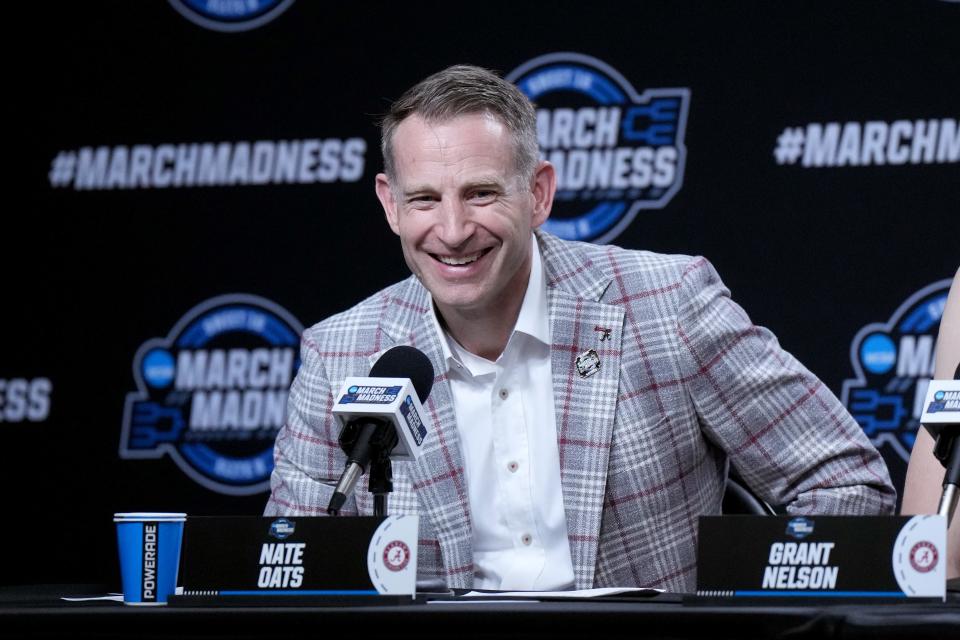
The teacher was skeptical. Then Andy repeated it. I can read that. Soon, the teacher gave him a chance to prove it right there and then and read in front of the class. Then, Andy did.
When the teacher asked Andy where he learned to read, he revealed his instructor: Nate.
“He’s had that teaching element from a very young age,” Larry said, more than 40 years later.
The nature was there within Nate to become an educator, then the nurture made it happen. He grew up around teachers. Larry is a longtime professor and dean at Maranatha Baptist University in Watertown, Wisconsin. That’s where Nate grew up, played basketball and attended college. Many of his teachers and professors also went to the same church, so he saw them on Wednesday nights and Sundays, too. Plus, his parents were friends with teachers.
Nate was all but destined to become an educator of some type. The next step was to choose his subject. He eventually taught math, but the longest and most intense studying he did was of basketball.
Nate couldn’t get enough of the sport as a kid. He and his close friend, Luke Akins, put their money together to buy instructional basketball workout videos. They purchased VHS tapes featuring the likes of Pete Maravich and Rick Pitino providing instruction on drills, ball handling and more.
“He was constantly working to improve his game,” Akins said.
Nate used money from his paper routes to buy the TV that he paired with his brother’s VCR. Andy and Nate combined their purchases to watch the videos in their basement. The brothers shared a bedroom downstairs, recording no shortage of live basketball games on VHS.
Nate also worked skills in the basement. Andy watched many nights as his brother sat in bed, shooting a basketball toward the ceiling, working on his follow through. Again and again and again.
“He was pretty intense,” Andy said, “pretty much whatever he did.”
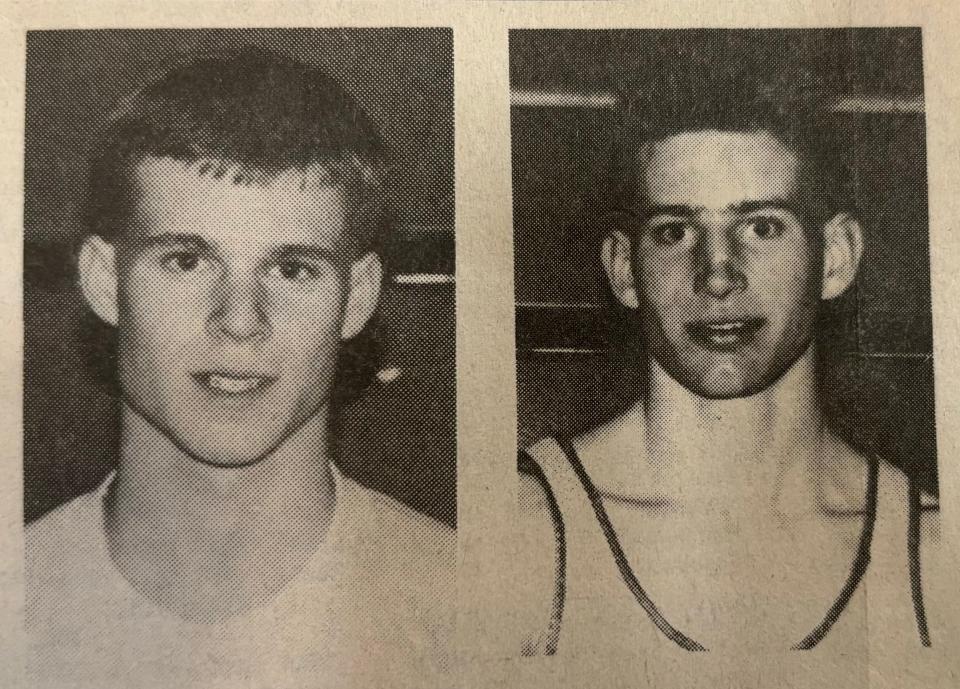
Chopping wood
Nate chopped wood for almost two decades.
The Oats family heated its house with wood for years. That requires plenty of lumber over the course of a Wisconsin winter, so Larry sought help.
Nate started hauling the wood when he was about 5 or 6. Nate wasn’t handling the chainsaw right away, but there were ways for him to chip in. He could haul it, split it and stack it. He also learned how to keep the fire going. Nate eventually gained chainsaw duties, too.
The Oats family chopped wood all summer and hauled it all winter. That’s where the roots of Nate’s work ethic began, and it only grew from there.
After their senior year of high school, Nate and Akins each secured summer jobs working for a roofer in Watertown, tearing roofs off and putting roofs on houses. They started early and worked late. The days could last 10 hours with Nate and Akins often baking in the summer sun.
Afterward, Akins often wanted to go home, shower and relax for the rest of the night. But Nate often wanted to go to the gym and get in a workout. He went on to become a captain and all-conference basketball player at Maranatha Baptist in college.
“Nate would push me just because of who he was,” Akins said. “Just so driven, to get the max potential out of his body and the athletic ability. Just willing to put the hours in, even when he was exhausted.”
That applied to workouts, jobs, sports and paper routes. Nate had to grind if he wanted a car, or trendy clothes. Nate had to buy them himself. He’s now one of the highest-paid coaches in college basketball, a step above his pay as a paper boy, but Oats' approach to work hasn't changed.
“Nate’s going to work hard,” Larry said, “and he’s going to work hard at what he wants to accomplish.”
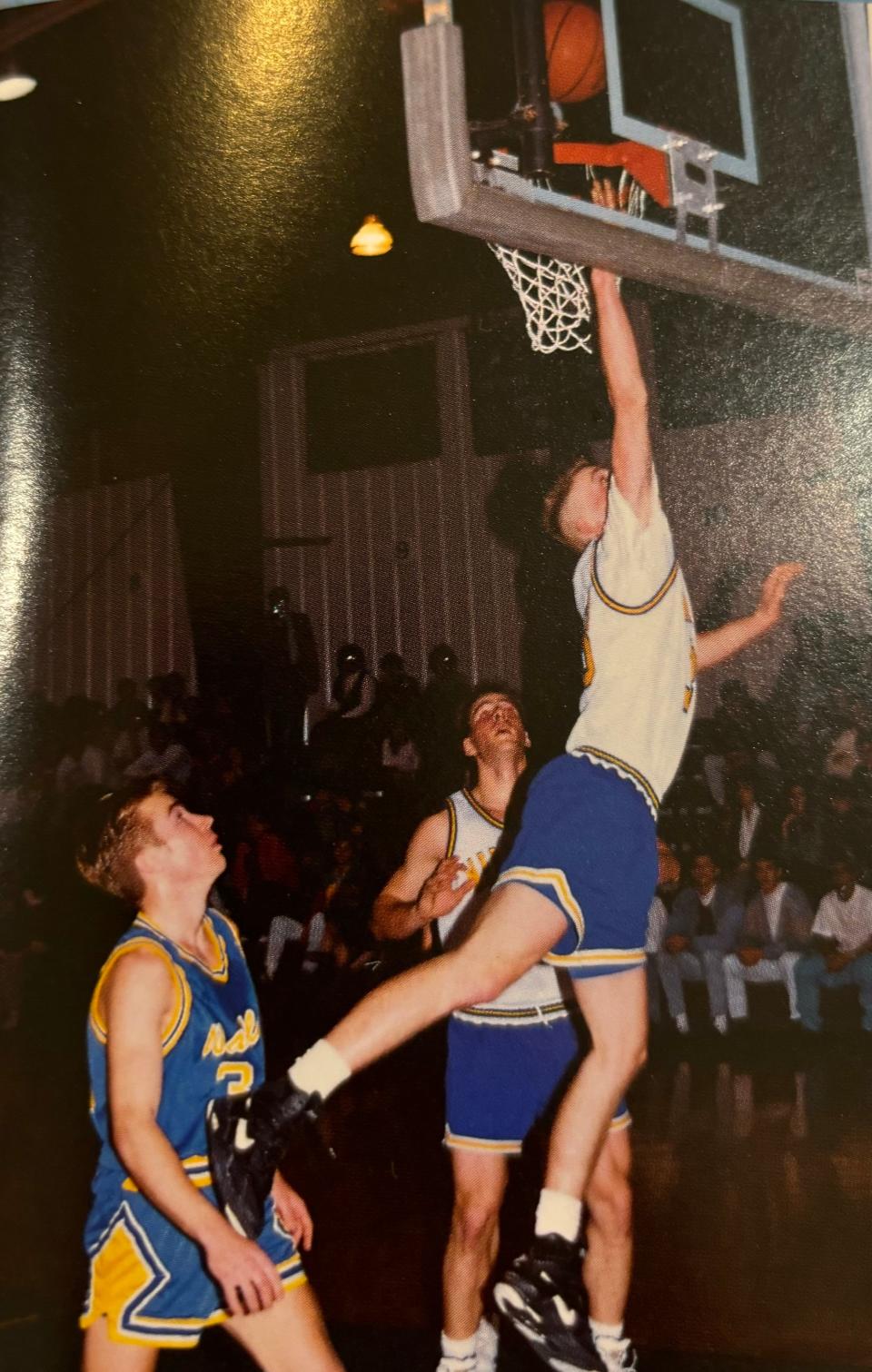
Nate Oats' rise in the coaching profession
Christian Pino shared a prediction with his mom in the early 2010s that might have seemed crazy then but now not so much.
The prediction? Nate is going to win a national championship one day.
Pino, then a player for Oats at Romulus, just knew. He saw Nate arriving at 6 a.m. every day to work players out before school. Then Nate would teach all day, grading papers whenever he had the chance. After school, Oats was in the gym with his team until 8 p.m.
“I was like, this guy works too hard not to be the best ever,” said Pino, now Oats’ director of player development at Alabama. “He just had confidence and everything about him screamed winner.”
After assistant coaching stints at his alma mater and then Wisconsin-Whitewater, Nate had a chance to take the Romulus job in Michigan. One of Nate’s buddies who lived in Detroit called him up and told him about the opening. Soon, he was interviewing, which included teaching a math class for a day; an audition of sorts. At age 27, Nate became a head coach.
Then he ran his high school program like a college one. Nate had five or six MacBook laptops to break down video. He had three different cameras to provide film for his players to consume, which he burned onto DVDs for them.
“A lot of my guys would go to college and come back and say they watched way more film in high school than they did in college,” Nate said.
Then Nate started to succeed. He spent 11 seasons at Romulus, winning the state title in 2012-13, a season in which his program finished 27-1.
His success brought some collegiate attention, including some interviews with different MAC schools. One coach even promised Nate a job the next time an assistant position opened. But when one of those jobs came open, the coach didn’t offer it to Nate.
“Just kind of some frustration,” Nate said. “I said, ‘You know what, I’m good. I’m having fun here. I love my job. I love working with high school kids … I can be happy staying at the high school level if that’s what God has for me.’ Then right after I came to grips with, ‘I can do this the rest of my life and be good with it,’ then I got the opportunity.”
Bobby Hurley offered Nate a job at Buffalo as an assistant coach.
Nate went on to spend two seasons working under Hurley. Then Hurley left for Arizona State. Nate became the next coach at Buffalo, and from there, his success took off. He made three NCAA Tournaments in four seasons, advancing to the second round twice. That success put him on Alabama’s radar with an opening in 2019.
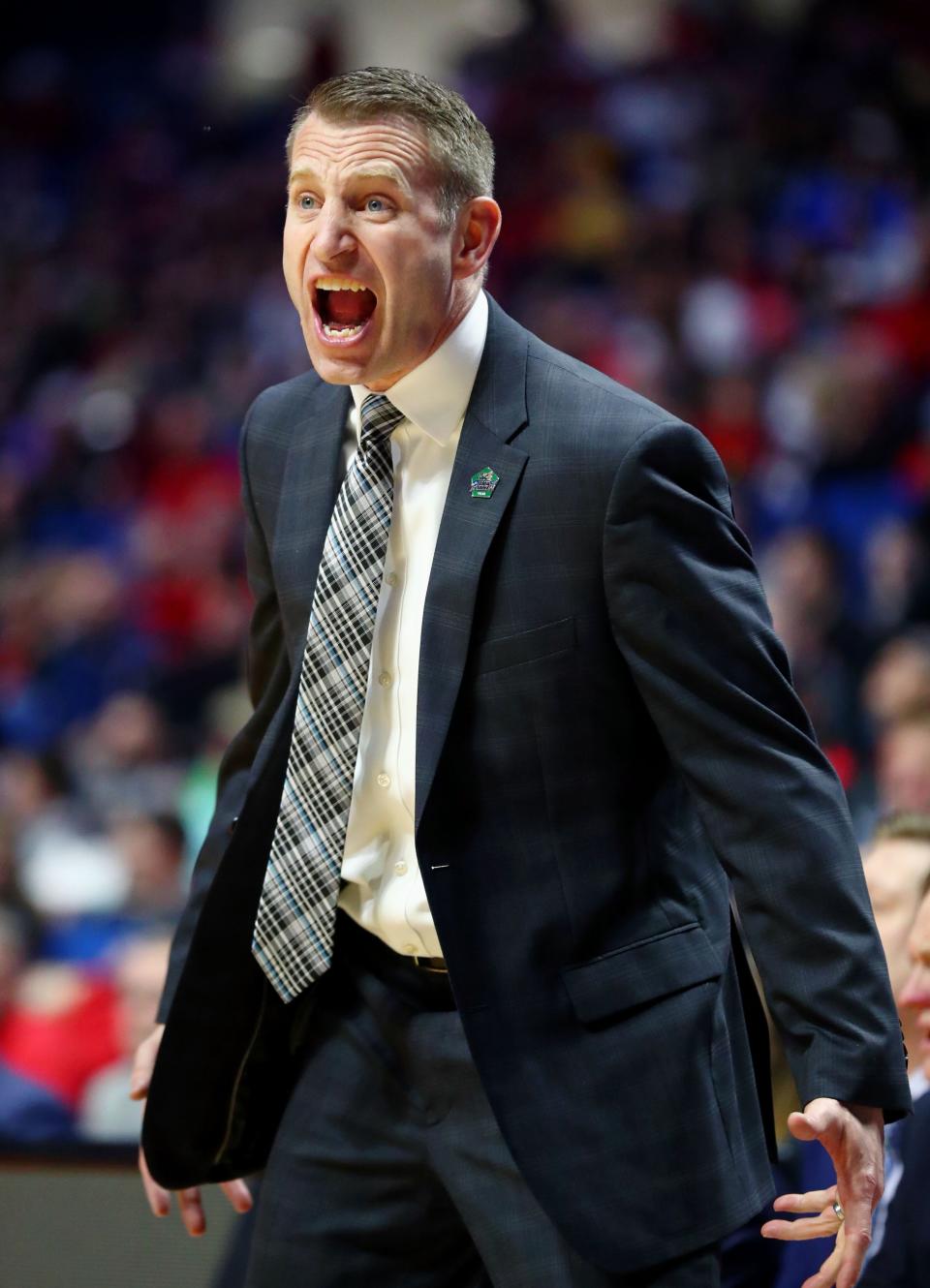
To take the next step in his career, Oats chose the Crimson Tide, even with another school pursuing him at the same time, per his brother.
“He knew he had a good foundation,” Andy said. “He just needed to change the culture and add some pieces to it, and it was ready to go.”
Still, some folks didn’t understand the decision. Akins remembers getting texts from puzzled friends and family. Akins preached patience to them.
Watch. Watch what he does.
In fact, Akins even told some friends and family Nate would reach a Final Four soon at Alabama.
“Which almost sounds over the top,” Akins said. “There’s no way that was said. But yes, just knowing Nate, how hard he was going to work to get the players he needed for his system, and for them to buy in, give him five years, and he’s going to be in the Final Four. I just knew that, in just watching what Nate has done.”
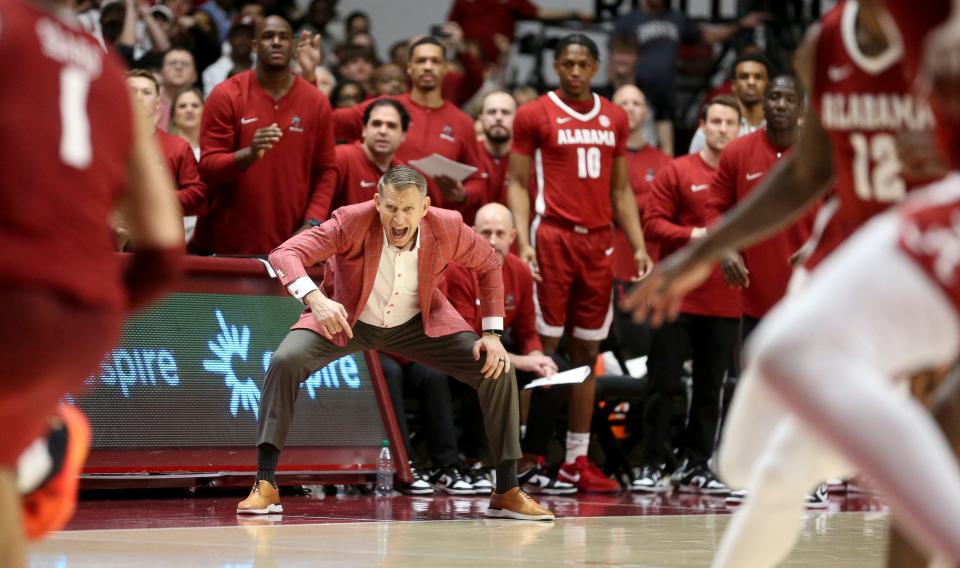
The Alabama basketball offseason of 100 hats
Nate had to reconstruct the Alabama roster almost by himself heading into the 2023-24 season.
In a short period of time, he lost all three assistant coaches who left for Division I head coaching jobs. Then, he had three scholarship players depart for the NBA Draft, two of whom became first-round picks in Noah Clowney and Brandon Miller, the SEC player of the year. Meanwhile, a couple players departed in the transfer portal. So without an assistant coach on staff, Nate was forced to try to keep players and add new ones all at once.
Pino was one of the few staff members remaining and witnessed the chaos.
“That was an unbelievably stressful time,” Pino said. “He had to wear 100 hats at a time.”
Nate stayed up until the wee hours of the morning often working. One day, at about 2:30 a.m., shortly after he decided to hire Austin Claunch as an assistant coach, Nate called Pino and connected the three of them on a call. Claunch was driving over to Tuscaloosa, and he needed to start working right away. Finally Nate had an assistant coach on staff.
You guys get together. Get the recruiting list together. And let’s hit the ground running.
They did. Alabama soon added guards Aaron Estrada and Latrell Wrightsell Jr. via the transfer portal. To his staff, Nate hired Ryan Pannone and Preston Murphy.
The challenges didn’t end in early spring, though. Roster shuffling continued. After Jahvon Quinerly originally announced he was staying, he changed course for Memphis. Charles Bediako, whom the Crimson Tide expected back, decided to stay in the NBA Draft.
That left Alabama without a rim protector, and a good one at that; Bediako was the anchor on the defense of the SEC championship team in 2022-23.
Alabama never added a player to truly replace Bediako because of how late in the offseason that decision was made, but Nate and staff kept retooling. It landed Grant Nelson from North Dakota State, five-star recruit Jarin Stevenson who reclassified, and West Virginia’s Mo Wague from the transfer portal.
For a while, the roster looked like it was going to put together a down year. It didn’t win the SEC regular-season title or the SEC Tournament championship. Then, the way it was playing at the end of the regular season, the Crimson Tide appeared to be in line for a March Madness upset more than a run.
Fast forward a couple weeks, and Nate has this team playing its best ball, going farther in the NCAA Tournament than any Alabama team before.
“This has been his finest season yet,” Pino said. “He has done a remarkable job. He’s made every single person on staff raise their level to his level.”
The lottery loser
Nate tried again and again to make the Final Four when he was a teenager in Wisconsin. It was nothing more than a long-shot, though.
He and Akins entered a lottery for Final Four tickets for four or five years. Each time, they put $100 in. Each time, they missed out.
“Never got tickets," Akins said.
That would have been too easy. It wouldn’t have been a fitting way for Nate to end up at the Final Four. There’s not much blue collar to winning a ticket raffle. Just some luck. Nate has caught some breaks over his career as all successful coaches do, but he prepared for luck to strike. Nate chopped wood and chucked newspapers to be able to be here. He tossed basketballs in his bed and graded papers to make possible this moment.
Nate’s road from Watertown to Phoenix has not been short, but the reward is not some cheap victory resulting from luck in a ticket lottery. He earned this.
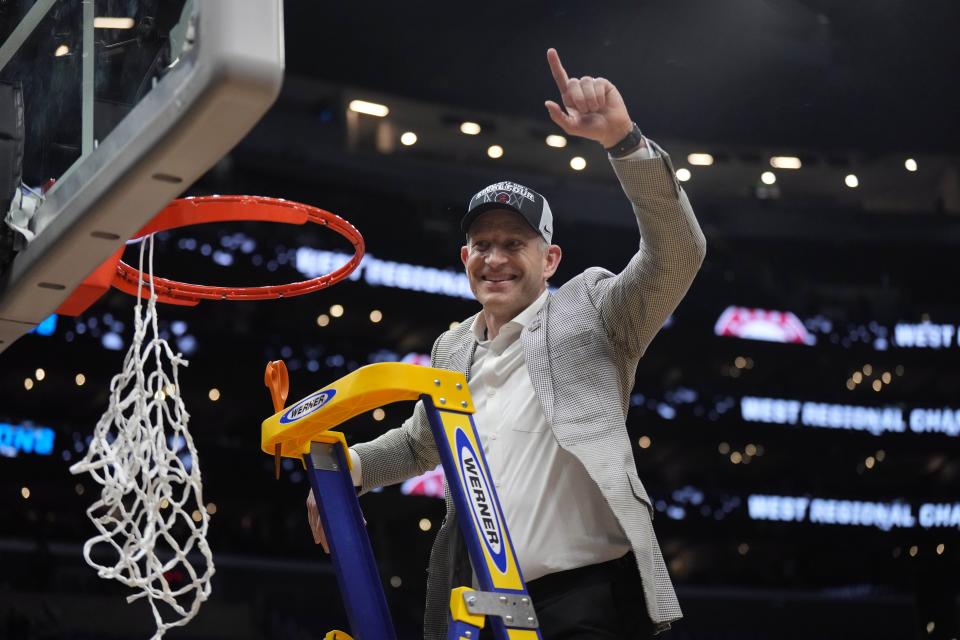
Nick Kelly is the Alabama beat writer for The Tuscaloosa News, part of the USA TODAY Network, and he covers Alabama football and men's basketball. Reach him at nkelly@gannett.com or follow him @_NickKelly on X, the social media app formerly known as Twitter.
This article originally appeared on The Tuscaloosa News: Nate Oats: Inside Alabama basketball coach's journey to Final Four

